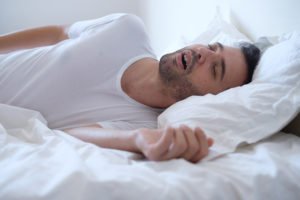Obstructive Sleep Apnea
 Many patients assume that a dentist is strictly responsible for cleaning their teeth, but don’t realize that dentists in the Newbury Park and Westlake Village areas are responsible for detecting larger oral health conditions. One of those is obstructive sleep apnea, which impacts one in 15 adults. Unfortunately, however, obstructive sleep apnea is the most commonly undiagnosed chronic disease in the country. Nearly 80 percent of people that suffer from obstructive sleep apnea are unaware of the condition from which they suffer.
Many patients assume that a dentist is strictly responsible for cleaning their teeth, but don’t realize that dentists in the Newbury Park and Westlake Village areas are responsible for detecting larger oral health conditions. One of those is obstructive sleep apnea, which impacts one in 15 adults. Unfortunately, however, obstructive sleep apnea is the most commonly undiagnosed chronic disease in the country. Nearly 80 percent of people that suffer from obstructive sleep apnea are unaware of the condition from which they suffer.
What Is Obstructive Sleep Apnea?
Obstructive sleep apnea occurs when breathing patterns are interrupted during sleep. Breathing can become very shallow, or even stop completely. Obstructive sleep apnea occurs because of a blockage of the upper airway, which causes the lungs to strain in desperate need of oxygen. This is typically accompanied by a snort, gasp, or jerking motion. These brief moments where sufferers stop breathing can happen hundreds of times a night.
Because of these gasps and body jerks, sufferers typically are victims of restless and interrupted sleep, with the worst sufferers being woken up completely in the middle of the night. In addition to harming sleep patterns, sleep apnea can result in irregular heartbeat and a shortage of oxygen to vital organs.
Additionally, those with obstructive sleep apnea will suffer from dry mouth, sore throat, and headaches. They will also notice fatigue, daytime sleepiness, trouble concentrating, depression, irritability, and forgetfulness.
If left untreated, obstructive sleep apnea can also lead to more severe issues including stroke, heart disease, diabetes, chronic acid reflux, and high blood pressure. Men are almost twice as likely as women to develop sleep apnea.
How Can Your Dentist Help?
In addition to visible symptoms, there are some other indicators that can help your dentist diagnose obstructive sleep apnea. While your doctor may not regularly look at your mouth and sinuses, your dentist takes a look every visit. Because of this, your dentist may be more likely to suggest a sleep apnea treatment.
Your dentist may notice things such as a scalloped tongue, a severe overbite, or a large neck circumference. They may also notice things such as enlarged tonsils, eroded enamel, a decreased intermolar distance, and bruxism.
If your dentist notices any of these signs, they will likely request to perform a series of pre-screening tests to confirm if you’ve been suffering from sleep apnea. If you think you’ve been suffering from a lack of sleep or find yourself short of breath or jolting awake in the middle of the night, you should bring this to your dentist’s attention and ask for a screening.
If it’s confirmed that you suffer from obstructive sleep apnea, your dentist will likely suggest one of two treatment options. Your dentist could suggest the use of a CPAP machine, which allows for controlled, steady breathing. Or, they could suggest wearing an oral appliance, which is similar to a mouth guard. If neither of these options work, surgery may be recommended to remedy the problem.